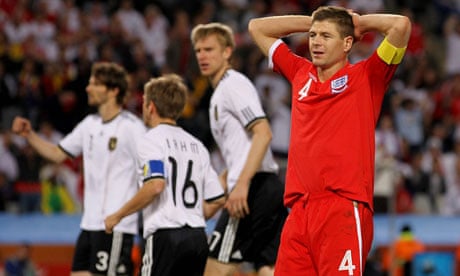There was no golden generation after all. But let us be generous, for once, and say without irony that a bunch of gifted footballers finally disappeared into a Free State sunset last night. Although their deeds in the shirt of the national team may never have matched their promise, what they accomplished in the colours of some of the world's biggest clubs certainly validated their authenticity as individuals. If they failed to bring home the expected trophies from international tournaments, at least they gave us plenty to talk about.
The truth is that they had been slipping away, one by one, for some time before the end came last night. The first of the core members to take his leave was Paul Scholes, whose disillusionment led him to retire from international football after the 2004 European Championships. Next went Michael Owen, his England career ended by an inability to persuade Fabio Capello that his full effectiveness had been restored after a series of debilitating injuries. The third was David Beckham, who had regained the coach's trust but whose Indian summer was ruined by an achilles tendon injury in March. Then Rio Ferdinand was abruptly excluded from participation in the 2010 World Cup by a twisted knee in a training session eight days before England's opening match.
• Follow the Guardian's World Cup team on Twitter
• Sign up to play our daily Fantasy Football game
• Stats centre: Get the lowdown on every player
• The latest team-by-team news, features and more
Now, following yesterday's defeat by Germany, the chances are that we have also seen the last of Steven Gerrard and Frank Lampard at a major international competition. Both can look forward to years of useful life at club level but their lease on an England shirt has expired and whoever picks up the threads left by Capello will need to be thinking in terms of a fresh start.
Gerrard and Owen are 30, Lampard and Ferdinand 32, Beckham and Scholes (whom Capello, at his wits' end, tried to recall) 35. They made their senior international debuts between 1995 and 2000 and share an aggregate of 421 caps, which would have been many more but for injuries, a long suspension and Scholes's self-imposed exile. In football terms they are now senior citizens. Advances in kinesiology and other fitness sciences mean they will be with us for a while yet but no longer as the standard bearers for a perhaps unwisely expectant nation.
Together they symbolised England's hopes of turning the Premier League's astonishing global popularity into a second World Cup trophy in the FA's cabinet. At the start of their journey they were young, gifted and – with the exception of the admirably stubborn Scholes – hugely marketable, but now it can be seen that their pinnacle probably came that sunny late afternoon in Shizuoka, when they faced Brazil in the quarter-finals of the 2002 tournament in front of 47,436 spectators whose replica shirts were divided equally between the white of the European side and the yellow of the South Americans.
The vast majority of those fans were Japanese, and the ones who had elected to support England were, almost to a man, woman and child, wearing the names of Owen or Beckham inscribed on their backs. Those old enough to remember the Beatles' impact on Japan, almost 40 years earlier, identified a similar popular culture phenomenon. Owen gave England the lead and in that moment they seemed fully the equals of the best side in the world. Had Beckham or Scholes succeeded in preventing the move from which Rivaldo scored the equaliser or had Ronaldinho's audacious free-kick not been allowed to dip under David Seaman's crossbar, history might have been very different.
After that defeat the climate changed. Anticipation was no longer untainted by apprehension. At home the excitement grew greater every time they set off for a World Cup but underneath it was a feeling that disappointment would not be far away. The fans believed, and did not believe. They were prepared to give unconditional support while reserving the right to castigate those who failed to fulfiltheir dreams, even though most of them knew, deep down, that those dreams were no longer realistic. Their apprehension was shared and after their first two matches in South Africa even Capello was speaking of the "fear" of the tournament exhibited by these highly experienced players.
The immoderate affluence of the leading Premier League players began to turn the leaders of the golden generation into easy targets and at the 2006 World Cup they allowed themselves and their entourage to become a laughing stock. A sense of entitlement finally overwhelmed what had once been a bunch of ordinary lads, essentially no different from, and no less talented than, those assembled by Alf Ramsey in 1966.
It distorted their behaviour off the pitch and led them to believe that success on it was no more than they "deserved" – the most popular word in their lexicon when, after losing a penalty shoot-out to Portugal, they were lamenting the premature departure from their luxury headquarters in the hills of the Black Forest as though the talent and superior motivation of lower-ranked teams were some sort of offence against nature.
So the era that began on a hot June night in France 12 years ago with a flash of lightning – Owen's scamper through the Argentinian defence – and a roll of thunder – Beckham's red card – is finally over. Now we can see how that defeat in Saint-Etienne defined the generation: a moment of deserved exhilaration closely followed by the confrontation with catastrophe. And when the end came, it was a real coup de grâce, appropriately flavoured with controversy and delivered by merciless opponents.

